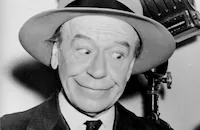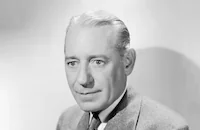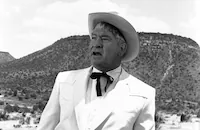Rationing

Brief Synopsis
Cast & Crew
Willis Goldbeck
Wallace Beery
Marjorie Main
Donald Meek
Dorothy Morris
Howard Freeman
Film Details
Technical Specs

Synopsis
When beleaguered Tuttleton grocer Ben Barton requests gas coupons from Iris Tuttle, the strict, surly postmistress and the head of the local rationing board, he receives a lecture on thrift instead. Ben's frustration with government regulations and Iris, who has been feuding with him for twenty years, is momentarily relieved when he learns that his adopted son Lance has enlisted. Lance also announces that he is marrying his childhood sweetheart, Iris' daughter Dorothy, before leaving for training camp. Ben gives his blessing, but warns Lance and Dorothy that Iris, a widow to whom he was once engaged, will not be so generous. To Lance's and Dorothy's surprise, Iris approves of her daughter's choice, but strongly suggests that they wait until after the war to marry. Dorothy rejects Iris' advice, but Lance has second thoughts, even though he knows that Ben and Iris' feud started when Ben inadvertently married a French woman while he was a soldier during World War I. After Dorothy angrily breaks off with him, the heartbroken Lance leaves for the city, explaining to Ben that Iris would have endorsed their elopement if he had had $2,000 in the bank. Hoping to improve matters, Ben tells Lance that his birth parents left him a $2,000 inheritance, then rushes to sell half of his grocery store to gas station owner Cash Riddle in order to back up his claim. Later, as Ben is about to give Miss McCue, the comely new barber, a girdle from his store, a jealous Iris announces that girdles have been "frozen" by the government. Ben sneaks the girdle to Miss McCue that night, but when the snooping Iris demands a girdle "count," Ben is forced to retrieve the girdle from an uncooperative Miss McCue. After he is nearly caught sneaking the girdle out of the barber's apartment, Ben goes to Washington, D.C. to see fellow veteran Senator Edward A. White. Ed is out of town, however, so his staff sends Ben all over town in a futile attempt to "unfreeze" girdles. Days later, Ben is finally able to speak with Ed, who tells him that girdles have never been rationed. When Ben, who was Ed's drill sergeant, asks the senator to "pull some strings" so that he can re-enlist, Ed agrees to give him a war-related job. Ben returns home to await his enlistment papers and is shocked when he learns that Ed has appointed him head of the Tuttleton rationing board. Ben then discovers that his store has been without meat since his departure. When Ben offers to discuss the shortage with the government-sanctioned cattle sellers, Cash, who has been running the store in his absence, insists on doing it himself. Unknown to Ben, Cash is involved in a black market ring, led by Dixie Samson, and has been selling illegal meat using a phony government stamp. To keep Ben from getting suspicious, Samson gives Cash six sides of illegal beef. Tuttleton's sudden influx of beef catches the attention of butchers from neighboring towns, who demand to know why Ben's trucks have been seen carrying loads of meat when they have been meatless for weeks. Although Cash explains that Ben has been making deliveries for the Army, the butchers, as well as the townspeople, remain suspicious. Ben is also suspicious and demands to meet the government representative for whom Cash claims to be working. Cash sends Ben to see Samson, and while posing as a civil servant, Samson offers Ben a bribe. Demanding $5,000, Ben pretends to go along with the scheme, but later telephones Ed to report the situation. Soon after, Ed arrives in Tuttleton, and together, he and Ben deduce the location of Samson's illegal slaughter-house. While Ben goes off to confront Samson at the slaughter-house, Lance, who has returned to Tuttleton on a two-week furlough, prepares to marry Dorothy. At the remote slaughter-house, Ben is tied up and imprisoned by Samson, but talks Cash into freeing him. Ben becomes embroiled in a fight with Samson and his men, while Lance and Dorothy hold off their wedding ceremony, awaiting Ben's return. Ed then reveals to the townspeople that Ben may be in trouble and rallies them to help. Ed, the police and the others race to the slaughter-house and, after a fierce fight, subdue the criminals. Later, Iris informs Ben that she has bought Cash's half of the store and hands him a marriage license to sign. Ben at first refuses, but when he sees the seventy-two forms he needs to fill out in order to rescind the new partnership, he gives in and signs.

Director
Willis Goldbeck
Cast

Wallace Beery

Marjorie Main

Donald Meek

Dorothy Morris

Howard Freeman

Connie Gilchrist
Tommy Batten

Gloria Dickson

Henry O'neill
Richard Hall

Charles Halton

Morris Ankrum
Carol Ann Beery

Douglas Fowley
Chester Clute
Milton Parsons
Sarah Edwards

Chill Wills
Frank Darien
Al Hill
Arthur Space

Don Costello
Pearl Early
Suzanne Kaaren
Kathleen Williams
Natalie Draper
Hazel Brooks

Kay Medford
Walter Soderling
Milton Kibbee
Eddy Waller
Erville Alderson
Ed Kilroy
Robert E. O'connor
Ben Hall
Art Belasco
June Terry Pickrell
Anne O'neal
Jack Baxley
Paul Burns
Crew
Glen Barner
Howard Campbell
Orville O. Dull
Grant Garrett
Cedric Gibbons
Irene
William R. Lipman
Al Raboch
Harry Ruskin
Douglas Shearer
David Snell
Norman Taurog
Sidney Wagner
Ferris Webster
Edwin B. Willis

Film Details
Technical Specs

Articles
Rationing
For Rationing, MGM's writers assembled a series of jokes about one of the pressing issues of life on the home front during World War II. Rationing had started with the U.S.' entry into World War II in December 1941. First tires, then sugar, coffee, cigarettes, gasoline, meat, butter, cheese, oils, processed foods and shoes were only available in limited supplies back home in order to properly outfit the armed forces. People were issued ration stamps and tokens to present when buying those precious items, while government advertising campaigns advocated public transit and "meatless Tuesdays" as a means of coping with wartime shortages. At the same time, black markets sprung up around the country, offering limited goods at a premium, and some people took to hoarding ration stamps and precious supplies. The situation had already inspired other Hollywood films, turning up in the home front drama Tender Comrade, with Ginger Rogers, and the Popeye cartoon "Ration fer the Duration" (both 1943).
MGM cast Beery as a small-town butcher whose decades-long feud with postmistress Marjorie Main takes off when she's put in charge of rationing. It doesn't help matters that the two had once been engaged, with Beery dumping her for a Frenchwoman during World War I. And just to make matters worse, their children decide to get married, forcing the two grouches to find some common ground. While shepherding the children to the altar, Beery also takes on black market meat dealers and a sexy lady barber, all under Main's watchful and, as it turns out, jealous eye.
This was the fifth of seven films Main made with Wallace Beery. Since Marie Dressler's death in 1933, MGM had not had a strong character woman to pit against him on screen. At first, that wasn't an issue, as he continued to flourish in top studio product, often teamed with major stars like Clark Gable and Jean Harlow. By the 1940s, however, Berry's cantankerous nature had relegated him to mostly lower budget films, while aging made him a less likely on-screen match for younger, more glamorous leading ladies. The studio out Marjorie Rambeau as his sparring partner and love interest in 20 Mule Team (1940), but it was the film released after that, Wyoming (1940), that first paired him with his second great co-star after Dressler, Main.
With her unique voice and large frame, Main could more than hold her own opposite Beery. Her taciturn on-screen persona was matched by a strong, independent spirit off-screen, making it easier for her to deal with her temperamental co-star. The studio and Beery were so happy with her performance in Wyoming she was offered a seven-year contract, with a new one following in 1947. The studio also gave her supporting roles in glossier films like Meet Me in St. Louis (1944) and, on loan to Universal, The Egg and I (1947). The latter brought her an Oscar® nomination and a top box-office series built around her character, Ma Kettle. Over time, however, Beery tired of being paired so much with the homespun character actress. On the rare occasions he spoke to the press, he complained that "I always go out with pretty ladies -- in fact, beautiful girls. I can get inspired more if they'd give me a good pretty actress to work with."
Not speaking to the press was one of the perks of Beery's long-standing popularity at the box office. It also was a benefit of working on lower-budget films. In addition to ignoring the press, he also mandated a daily nap and a firm quitting time of 5:30 p.m. If they wanted to work more quickly, they could shoot the other actors' scenes while he was sleeping or on the way home. And as long as his films turned a profit, which they did for the rest of his career, nobody dared deny him his little pleasures.
Rationing did the usual solid business and proved particularly popular on Army camps, where the soldiers delighted in its comic vision of life back home. The wartime Office of Censorship was less pleased. They refused to approve the film for release overseas, feeling the emphasis on rationing made it seem as if U.S. citizens were suffering unduly under wartime restrictions. They also objected to the depiction of the black market, which suggested not all Americans were united in the war effort. It took MGM a year to make enough cuts to clear the film for export.
Producer: Orville O. Dull
Director: Willis Goldbeck
Screenplay: Grant Garrett, William R. Lipman, Harry Ruskin
Cinematography: Sidney Wagner
Score: David Snell
Cast: Wallace Beery (Ben Barton), Marjorie Main (Iris Tuttle), Donald Meek (Wilfred Ball), Dorothy Morris (Dorothy Tuttle), Howard Freeman (Cash Riddle), Connie Gilchrist (Mrs. Porter), Tommy Batten (Lance Barton), Gloria Dickson (Miss McCue), Henry O'Neill (Sen. Edward White), Morris Ankrum (Mr. Morgan), Douglas Fowley (Dixie Samson), Chill Wills (Bus Driver), Carol Ann Beery (Carol Ann), Kay Medford (Information Girl).
BW-93m.
By Frank Miller

Rationing
Quotes
Trivia
Notes
Wartime rationing began on December 27, 1941, and the Office of Price Administration (O.P.A.), which fixed price ceilings on most commodities and set up rent control in defense areas, was established on January 30, 1942. The first items to be rationed were automobile tires, followed by sugar, coffee, cigarettes, gasoline, meat, butter, cheese, oils and fats, processed foods and shoes. Black markets sprang up as a result of the shortages, and hoarding of ration stamps and tokens became a problem in many areas.
An M-G-M publicity item credits Robert Hopkins with the original story for this film, but no other source mentions him. Although Wallace Beery's daughter, Carol Ann Beery, received an onscreen credit for the 1935 M-G-M picture China Seas, her role in Rationing marked her first actual screen appearance. Despite the reported popularity of the film among Army camp patrons, the Office of Censorship, Los Angeles Board of Review, disapproved the film for export, complaining that its "undue emphasis on rationing throughout" made it unacceptable for overseas distribution. In January 1945, after the studio had made a number of eliminations, however, the Board approved the film for export.















